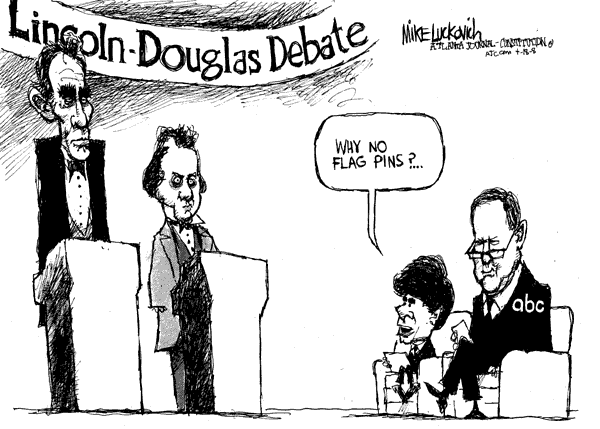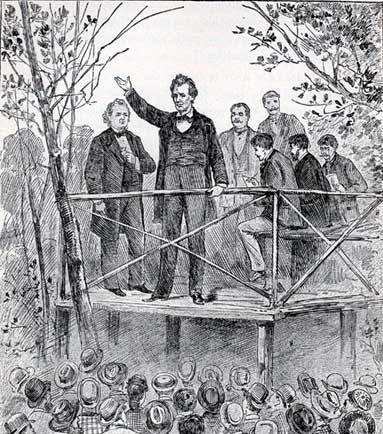1860’s Politics: Lincoln-Douglas Debates Continue, Part III: Self-Government and Political Correctness

 If we define political correctness as demanding conformance with favored positions, not tolerating contrary opinions, and branding opponents or perceived opponents as radicals (“they are just evil/crazy/stupid”), all without offering rational counter arguments, then these are not new phenomena.
If we define political correctness as demanding conformance with favored positions, not tolerating contrary opinions, and branding opponents or perceived opponents as radicals (“they are just evil/crazy/stupid”), all without offering rational counter arguments, then these are not new phenomena.
Abraham Lincoln faced the same problems in his debates with Stephen Douglas for the U.S. Senate seat from Illinois in 1858.
Part I and Part II of this series discussed Douglas’s proposed “popular sovereignty,” the concept that inhabitants of a territory should choose for themselves whether to allow slavery or not during the process of becoming a state. Lincoln countered that the “notable argument of popular sovereignty” was simply another name for the sacred right of self-government, but that Douglas was perverting the idea in applying it to “choice” concerning slavery.[1]
No man believed more than he in the principle of self-government, declared Lincoln: “it lies at the bottom of all my ideas of just government, from beginning to end.” Each individual citizen, “was naturally entitled to do as he pleases with himself and the fruit of his labour, so far as it in no wise interferes with any other man’s rights,” and, “the general government upon principle has no right to interfere with anything other than that general class of things that does concern the whole.”[2]
Therein lay another of their principal differences: Douglas maintained that slavery was not an issue of the whole, just an ordinary fact of American life pertaining only to people concerned. Slavery agitation resulted from abolitionist agitation, not moral wrong; questions of right and wrong were not germane to public policy because they cause too much trouble.
Douglas in private was not pro-slavery, but he could say nothing against it publicly or his North-South coalition would disintegrate. The senator believed that the institution would never prosper in the West, would die out eventually as the country grew and flourished, and that the moral risk of allowing Southerners to believe it could be extended was less than the risk to the nation by denying that option and inviting conflict.
 Lincoln defined the issue differently: the Douglas narrative posited slavery as “an exceedingly little thing” equivalent to the cranberry laws of Indiana or a decision to hold land in pasture or plant it with tobacco.
Lincoln defined the issue differently: the Douglas narrative posited slavery as “an exceedingly little thing” equivalent to the cranberry laws of Indiana or a decision to hold land in pasture or plant it with tobacco.
Therefore, if he, Lincoln, should advocate any steps to bring about the ultimate end of that little thing, then he must also, per Douglas, be in favor of applying federal power to the amalgamation of all the people’s affairs. However, concluded Lincoln, “There is a vast portion of the American people that do not look upon that matter as being this very little thing. They look upon it as a vast moral evil.”[3]
“[Lincoln] was not a moral absolutist,” wrote Professor Allen Guelzo in his history of the debates, “and he did not doubt that popular majorities were the essence of free government. But there were certain moral lines even majorities could not cross, certain transcendent and foundational truths which no vote could repeal, and some preferences which no amount of Romantic passion could justify. Lincoln thus transformed the debates into a moral reply to liberalism’s preoccupation with process and unencumbered individualism, without indulging the bathos of religion.”[4]
Hotly debated issues of today fit this paradigm: Certain practices are seen by many citizens as simple life choices, not public concerns with moral content, perhaps “exceedingly little things.” Any attempts to restrict them, discourage them, or even to offer supportive options to them, are said to trample individual rights or to force others into conformation with principles they do not accept. However, a significant portion of the American people believe these choices have moral and communal significance that must be addressed. The stress continues between unencumbered individualism and beliefs seen as transcendent, foundational truths.
Since the Revolution, Southern leaders and intellectuals had proceeded by degrees from reluctant acceptance of a necessary but temporary evil to active promotion of slavery as a positive moral good, accompanied by insistence that counter opinions were illegitimate to the point of official prohibition by government edict.
 “You must not say anything about it in the pulpit,” Lincoln noted, “because that is religion, and has nothing to do with it. You must not say anything about it in politics, because that will disturb the security of ‘my place.’… In regard to that institution, [they] will not tolerate the merest breath, the slightest hint, of the least degree of wrong about it.”
“You must not say anything about it in the pulpit,” Lincoln noted, “because that is religion, and has nothing to do with it. You must not say anything about it in politics, because that will disturb the security of ‘my place.’… In regard to that institution, [they] will not tolerate the merest breath, the slightest hint, of the least degree of wrong about it.”
On another occasion: “Everything that emanates from [Douglas] or his coadjutors in their course of policy carefully excludes the thought that there is anything wrong in slavery.” He was acutely worried about this trend, devoting all his political energies to reversing it.[5]
Lincoln hated slavery and always had. He hated it because it was a monstrous injustice, depriving our republican example of its just influence in the world. It enabled enemies of freedom to taunt us as hypocrites and friends to doubt our sincerity. Most seriously, slavery, “forces so many really good men amongst ourselves into an open war with the very fundamental principles of civil liberty, criticizing the Declaration of Independence, and insisting that there is no right principle of action but self-interest.” This is a good definition of political correctness.[6]
Until recent events, Lincoln had been relatively quiet on the issue with the understanding that most Americans from the founders on were against the institution and that it was (in an oft-used phrase), “in the course of ultimate extinction.” As long as the public mind rested in this belief, Lincoln supposed, there should be peace on the issue. However, since the Kansas-Nebraska Bill and the Dred Scott decision, “I became convinced that either I had been resting in a delusion, or the institution was being placed on a new basis, a basis for making it perpetual, national, and universal.” He cited Henry Clay: If men would perpetuate slavery, they must first, “blow out the moral lights around us; they must penetrate the human soul, and eradicate there the love of liberty.”[7]
The pattern is familiar. Certain practices today have proceeded through stages from generally wrong in a communal perspective, to regrettable but occasionally understandable, to positive moral good in the eyes of proponents, who frequently insist that opposing opinions are illegitimate and should be suppressed. They, “will not tolerate the merest breath, the slightest hint, of the least degree of wrong.” Until recent decades, these were not highly divisive issues, possibly because most citizens rested in the belief that they were discouraged throughout social, religious, and civil life. They certainly were not celebrated.
These issues also have been placed on a new basis. One side claims them as rights, as favored forms of individual enjoyment and personal fulfillment, which they actively promote through all cultural mechanisms from advertising and art to entertainment. Others believe that these actions have severe consequences, and that they violate traditional social, civil, and moral responsibilities.
Slavery clearly was on one side of this divide. It was avoidable. It was a choice. No one was forced to own slaves. Proponents of slavery were tragically wrong, but most were normal, decent people—not fundamentally evil, crazy, or stupid. Lincoln said he would have thought like them if he had been raised like them.
The questions were, as Professor Guelzo noted: “Did popular government exist merely to ratify the decisions of its majorities, no matter what those decisions were, or was democracy wedded to a set of fundamental propositions that those majorities were accountable to? And where did those propositions come from?” What is the moral core to democracy?[8]
Personal choices of all kinds have consequences as well as implications for the moral glue binding society together. But current discourse often degenerates into political correctness, demanding that choices under discussion must be “perpetual, national, and universal.” Good people are, “forced into an open war with the very fundamental principles of civil liberty, and insisting that there is no right principle of action but self-interest.”
On the other hand, social practices and circumstances do evolve even in the face of opposition. One hopes those changes proceed rationally from open, frank, and objective interchanges under the Constitution and rule of law, and with due respect for moral weight of hard-earned lessons from history. What are the boundaries of self-government and permissible discussion? The debates continue.
[1] Lincoln, “Speech At Springfield, June 17, 1858,” in The Complete Papers and Writings of Abraham Lincoln: Constitutional Edition (Complete Seven Volumes), ed. Arthur Brooks Lapsley (Kindle edition) (Hereafter cited as Complete Papers).
[2] Lincoln, “Speech At Chicago, July 10, 1858,” Complete Papers.
[3] Ibid.
[4] Allen C. Guelzo, Lincoln and Douglas: The Debates That Defined America (New York: Simon and Schuster, 2008), xx.
[5] Lincoln, “Last Joint Debate At Alton, October 15, 1858,” Complete Papers; Lincoln, “Fifth Joint Debate At Galesburgh, October 7, 1858,” Complete Papers.
[6] Lincoln, “First Joint Debate At Ottawa, August 21, 1858,” Complete Papers.
[7] Lincoln, “Speech At Springfield, July 17, 1858,” Complete Papers; Lincoln, “First Joint Debate At Ottawa, August 21, 1858,” Complete Papers.
[8] Guelzo, Lincoln and Douglas, 261-262.